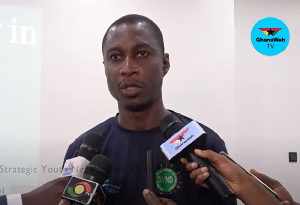 Executive Coordinator of SYND, Chibeze Ezekiel
Executive Coordinator of SYND, Chibeze Ezekiel
The Strategic Youth Network for Development (SYND) has called on the government to prioritise the use of internal resources to develop Ghana’s renewable energy sector.
According to the Executive Coordinator of SYND, Chibeze Ezekiel, Ghana and other African countries should not overly depend on donor support, but rather invest more in renewable energy to advance the energy transition agenda.
Speaking at the launch of a report titled “Youth Engagement in Ghana’s Energy Transition” in Accra on Tuesday, April 8, 2025, Ezekiel emphasised that youth participation is a key driver of the energy transition agenda.
He said, “We can’t continue to overly rely on donor support. Let’s look inward and identify the resources we have as a country to develop our renewable energy sector. One way is to redirect part of our oil revenues toward green energy investments. Another is to ensure that emitting companies comply with their obligations under the Renewable Energy Amendment Act.”
“We know the government has an ambition to transition by 2060 or 2070, but we believe that although those are very ambitious targets, young people must be involved. Our research shows that 38 percent of Ghana’s population is made up of young people between the ages of 15 and 35. If we don’t consciously involve them, it’s going to lead to serious problems for us,” he added.
Ezekiel further noted that although many young people are engaged in sustainable energy initiatives, they often lack the financial and technical support needed to scale their businesses.
This, he said, highlights the need for the government to provide incentives.
He mentioned funding, capacity-building programs, and policy incentives as key to nurturing these green energy-centered enterprises so they can thrive and help absorb unemployed youth into the job market.
This, he said, would ultimately boost economic growth within the renewable energy sector.
Among the key recommendations put forward by SYND are; the establishment of a comprehensive clean energy skills development program, the launch of a youth clean energy entrepreneurship fund, and the development of a digital platform for energy transition awareness and engagement.
Ghana’s energy transition agenda, formalized in the 2023 Ghana Energy Transition and Investment Plan (GETIP), aims to achieve net-zero energy-related emissions by 2060 through the deployment of low-carbon solutions across key sectors.
The Energy Transition Framework aims to meet future electricity demand of 380,000 GWh with an installed capacity of 83 GW.
Ghana’s diversified energy mix will include 21 GW of renewable energy, providing an opportunity to commercialise renewable energy carbon credits.
The agenda also seeks to improve energy access and promote economic development.
SA/MA
Watch the latest edition of BizTech below:
Click here to follow the GhanaWeb Business WhatsApp channel
